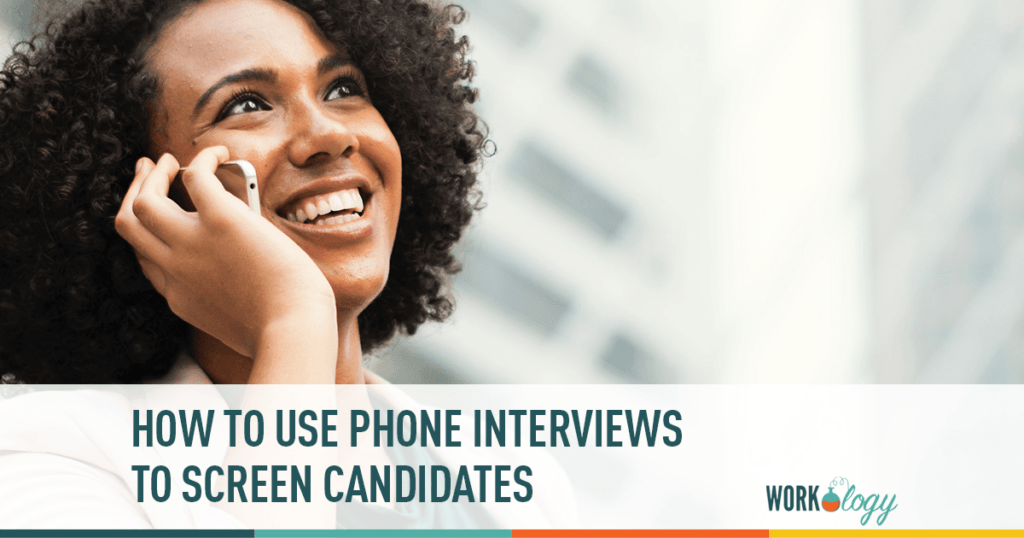How to Use Phone Interviews to Screen Candidates
Phone interviews give you an easy way to do a quick assessment of a candidate. They do not require coordinating schedules of an interview panel or arranging time for a candidate to come in, and they can be done wherever you have cell reception. During the phone interview, you can get the most basic questions out of the way to determine if a candidate is worth the time and energy involved in the whole in-person interview process. Here are some tips for getting the most out of phone interviews.
Review applications & resumes
As with any hiring process, always start with updating the job description and determining the skills and experience you want your ideal candidate to have. Screen applications and resumes based on these criteria and narrow the field down to your top choices.
You can use your application to do a little of the phone interview work ahead of time. Ask basic questions on the application about things like salary, availability and specific skills. You can then follow up and verify this information during the phone interview.
When you call a candidate for a phone interview, schedule the interview for another time. It could be as soon as later in the day or the next morning. Scheduling the phone interview gives the candidate some time to get their thoughts together and to ensure that they are in a quiet place for the phone call.
Get the basic information out of the way
When it comes to phone interviews, you want to keep the same things in mind that you would with in-person interviews. Avoid discriminatory questions, stay on schedule and make the candidate feel comfortable. Also remember to prepare your questions in advance. I like to have the questions printed out with space to take notes for easy review once I complete all the phone interviews.
Start with the basic information. Confirm that the candidates salary requirements are within the range for the position, check that their availability is a good match and make sure they can fulfill the essential functions of the job with or without reasonable accommodation (e.g. lifting, standing for long periods of time). If a candidate does not meet match these requirements, you can save time by ending the phone interview. You don’t waste the candidate’s time or your time going through a long interview process only to find out that the candidate is not in your salary range or lacks the availability needed for the job.
Then get into specific required skills. For example, “Are you proficient with Microsoft Excel?” I always like to follow up by asking, “Give me an example of how you used Excel in your last job.” This gives you an opportunity to confirm that the candidate actually has the experience they say they do.
Once you get through the basics, move into a couple questions that are similar to what you would ask in an in-person interview. These are the kinds of questions that give more detailed answers, so you can get a better feel for if they are the right fit. For a customer service position, you might want to ask, “Tell me about a time you had a difficult customer. How did you resolve it? If you weren’t able to resolve it, what could you have done better?” When I interview people for customer service positions, it’s a red flag if someone cannot answer this basic question. If I discover this in a phone interview, I have saved myself the trouble of calling in a bad candidate for an interview.
Phone interviews should be about 15-30 minutes (depending on the position). Remember that you are just trying to get a feel for whether this candidate might be a good fit. Make a note of areas you would like to pursue further during the in-person interview.
Schedule your top candidates for in-person interviews
At the end of the phone interview, let the candidate know the timeline for the interview process and how soon they can expect to hear back from you. It is a good idea to follow up with an email so that the candidate has your contact information. If you decide not to call a candidate in for an in-person interview, get in touch by phone or email to let them know that they are no longer being considered.
Narrow down your field of phone-interviewed candidates, and call in your top choices for in-person interviews. You can skip all the basic questions about things like salary and schedule during the in-person interview, and move right into more detailed questions about skills, experience and problem solving.










One Comment
Phone interviews if combined with online assessments can be very effective in attracting and hiring the right talent. This process helps remove the barrier of distance as well as saves a lot of time for the recruiter. While phone interviews help to understand the background and basic skillset of a candidate, assessments help to measure their hands-on skills as well as their individual personalities.
Comments are closed.